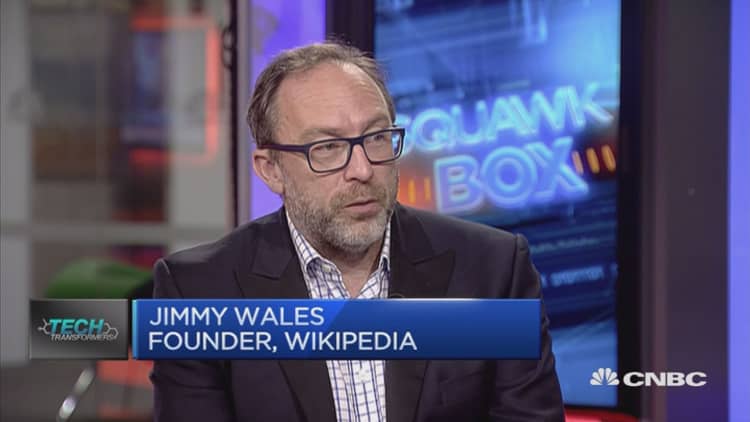Social media can often be an echo chamber, where views your hear and articles you read are just there to reaffirm your own beliefs. That was the view of a panel on Thursday which included Wikipedia founder Jimmy Wales, and Paul Hilder, the co-founder of political crowdfunding site Crowdpac.
Wales, who has been vocal on the spread of "fake news", said that social media firms can do more to help break the echo chamber by feeding people articles that challenge people's existing views.
What I would like to see from Facebook, if they flashed up one morning with a new option to say, 'help me get out of the filter bubble', where instead of you showing me things that my friends share … show me something you think I won't like … I don't want to see crazy crap, but I want to see, thinkers, politicians, news, that's going to challenge me," Wales said at the Viva Tech conference.
"There is a deeper more reflective approach than saying I don't want to be just a reptilian sort of of thing clicking on tidbits of food, that I want. I want to be a human being and be given thoughtful, reflective ideas."
Hilder jumped in and added that Facebook could be under threat as a platform if it does not adopt an approach like this.
"If Facebook doesn't really get this, it doesn't find ways to more deeply enrich their users' lives over the next period, then they are going to be challenged by insurgents," Hilder said.
"I actually think that we are living now in an environment where if needs are not being met then the challenge will come faster and faster … and I think that we should not assume that monopoly platforms at the moment will be monopolies forever."z

Internet companies like Facebook and Google have been slammed for allowing "fake news" on their platforms and not dealing with it fast enough. Both firms have introduced steps to improve such as a "fact check" feature on Google search, while Facebook released a post about how to spot false articles.
Facebook said it is working on a number of areas to tackle fake news. One of those is trying to move financial incentive for fake news posters, by making it difficult for such people to buy ads on the platform, and updating detection of fake accounts. The social networking giant also made updates in May so people see fewer posts and ads in their News Feed that link to low-quality web page experiences.
The U.S. firm also said it's looking into ways to improve ranking of news articles.
"We've found opportunities like the fact that if reading an article makes people significantly less likely to share it, that may be a sign that a story has misled people in some way. We're continuing to test this signal and others in News Feed ranking in order to reduce the prevalence of false news content," Facebook said in a blog post earlier this year.
Facebook also received criticism about allowing fake news on the platform during the U.S. election last year. To address the issue, the company launched a product called "Perspectives" for the recent U.K. elections, which allowed users to compare different political parties' policies on the same issue.
Wales recently launched a new venture called Wikitribune, a news site that is going to focus on "evidence-based journalism". Wikitribune is asking for donations to pay for 10 journalists and Wales is currently hiring his team.
Wales told CNBC in May that Facebook was taking the issue of fake news seriously and is taking the right steps to address the problem. But if consumers felt they were being fed wrong information, then they could turn away from the platform.
"Consumers need to hold their (Facebook's) feet to the fire and say, 'you really need to take a look at this stuff because I don't want to be tricked by fake information'," Wales told CNBC in a TV interview.





